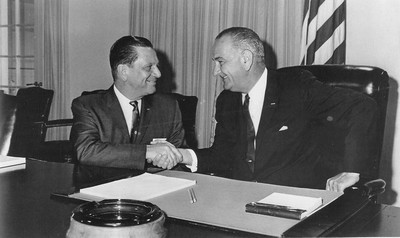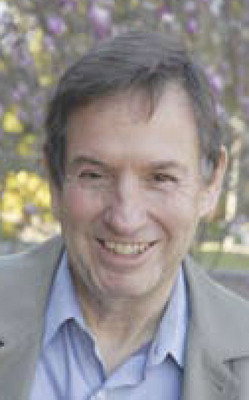Nevada senator wielded lots of clout with little charisma
EDITOR'S NOTE: Following is a review of a biography of the late Democratic U.S. senator from Nevada, Howard Cannon.
In 1957, fearing his business rivals might seek to put him in a mental institution, Howard Hughes married actress Jean Peters in a secret ceremony in Tonopah. To conceal the event, conducted after hours, both parties used false names.
The man behind this stratagem was a young Las Vegas lawyer who was in the process of making his own name: Howard Cannon, who would serve four terms in the U.S. Senate.
Cannon flew to Tonopah in a private plane to arrange the nuptials, performed late in the evening by the Nye County clerk who thought she was marrying a pretty young woman named Marian Evans to a Houston gentleman named J. Johnson. (Peters had agreed to protect Hughes from involuntary institutionalization.)
It was Cannon who had discerned that such an arrangement would be legally binding under Nevada law and Cannon who worked his contacts to make the arrangements. And yet, even after word later leaked out, Cannon didn't tell this remarkable tale.
"Cannon to his death never even acknowledged he played a role in the marriage, much less gave any details," Michael Vernetti writes in his biography of the late Nevada Democrat, published last year by the University of Nevada Press.
The episode fits with the portrait of Cannon that emerges in the biography: a man who wielded power quietly but effectively, whose life was filled with colorful episodes -- from surviving more than a month in Nazi-occupied Holland to winning the closest Senate race in U.S. history -- that he left it to others to discover and describe. Cannon died in 2002.
Like another Nevada Democratic senator, Majority Leader Harry Reid, Cannon's unremarkable presence belied his behind-the-scenes clout. He was a politician whose deficits of charisma were compensated for by a genius for procedural maneuvering.
He was a moderate-to-conservative Democrat whose Mormon family values coexisted with a desire to use government to help people, particularly the people of his home state, often by bringing home federal dollars. A private man with little use for the good life, he lacked the blowhard impulse but was fired by extraordinary ambition and drive.
And yet Cannon, whose 24-year Senate career ended in defeat and the taint of scandal in 1982, makes Reid look positively effervescent by comparison.
ADVOCATE FOR BENNY BINION
The biography provides a comprehensive look at the life of this important Nevadan. Vernetti's research into Cannon's papers, Senate and court records yields a fuller accounting of the senator's involvement in the Hughes marriage than was previously available.
It also reveals details about the Justice Department corruption investigation that helped end Cannon's political career and evidence of the striking lengths to which he went to try to get Benny Binion a presidential pardon.
But the prickly nature of his subject makes this book an often numbing read, as the author, a former Review-Journal and Associated Press reporter who was Cannon's Washington press secretary, is unable to offer much in the way of animating insight to enliven page after page of legislative procedures. Cannon, who is remembered mainly for the major roles he played in airline and trucking deregulation, spends the bulk of the book shepherding bills through various committees.
Cannon may have had a cold personality, but he can hardly be said to have lived a boring life. He emerged from World War II a hero after being shot down and hiding, disguised as a Dutch peasant, from the Nazis in the occupied Netherlands for 42 days.
Born in 1912 to a family of Mormon aristocrats in St. George, Utah, Cannon earned some distinction as a clarinetist and bandleader before the war. After his distinguished service as a pilot -- his honors included the French Croix de Guerre -- he moved with his bride, the former Dorothy Pace, to Las Vegas.
Cannon had showed an instinctive attraction to public office, challenging a sitting Republican county attorney in St. George less than a year after he graduated from law school.
Shortly after settling in Las Vegas in 1945, he attempted to run for city attorney by getting around the residency rules for the office. His argument that, as a serviceman, he essentially had had no legal residence was rejected.
In 1949, he succeeded in winning the post and used it as a launching pad for bigger campaigns, losing a bid for the House of Representatives before successfully capturing the U.S. Senate seat in 1958.
In 1964, he won re-election over then-Lt. Gov. Paul Laxalt by an initial count of 48 votes, revised after a statewide recount to 84 votes.
Early incidents like the Hughes marriage and the residency fight, though minor, showed a willingness in Cannon to bend the rules to suit his purposes. Cannon appeared not to have qualms about using power and connections -- old-fashioned Las Vegas "juice" -- to achieve his ends. Even as he worked in the Senate to enact sweeping campaign-finance reform, he exploited loopholes in the rules to obscure his own finances, for example.
Later, urged on by friend and onetime opponent Harry Claiborne, Cannon for years implored successive presidents to grant a pardon to the double murderer, tax cheat and Las Vegas casino mogul Benny Binion, with no success.
Like most Nevadans at the time, Cannon freely rubbed shoulders with the various dubious characters and organized crime figures who populated the Strip. Claiborne himself was convicted of tax evasion and removed from his federal judgeship by the Senate, with Cannon as his defender.
In this light, it is perhaps not surprising that Cannon got tangled up in the influence-peddling scandal that ended his career. The Teamsters union president at the time, Roy Lee Williams, eventually went to prison along with four others for a scheme to bribe Cannon.
Cannon was never charged with wrongdoing in the case, and his testimony helped put Williams and four co-defendants away. The Teamsters bosses, prosecutors alleged, had tried to bribe Cannon by giving his son-in-law a sweetheart deal on Las Vegas land in exchange for Cannon's help derailing trucking deregulation in the Senate.
Cannon testified that he did not seek or accept a bribe and was never even offered one. In fact, far from derailing the legislation, Cannon, by then the chairman of the powerful Senate Commerce Committee, pushed it forward over the Teamsters' objections. Still, the taint of scandal helped a little-known Republican state senator, "Chic" Hecht, ride the popularity of the newly elected President Ronald Reagan to an unexpected defeat of Cannon in 1982.
Cannon may have been innocent of corruption, but his entanglement in the Teamsters affair was partly his own doing. In a meeting with union operatives including Allen Dorfman, who was convicted along with Williams, Cannon listened noncommittally to the union's concerns about legislation, Vernetti writes.
Then, showing the men out of his office, Cannon introduced Dorfman to his son-in-law, Bob Bjornsen. And the senator mentioned that Bjornsen had been trying to purchase a parcel of land owned by the Teamsters next to the Las Vegas Country Club.
"To government prosecutors overhearing the subsequent efforts by Dorfman and others to make sure Cannon's group got the land, it was proof of a corrupt bargain," Vernetti writes: "delay or obstruction on the trucking deregulation bill in exchange for help with the land purchase."
CRITICAL CIVIL RIGHTS VOTE
Though Vernetti acknowledges Cannon made mistakes in conduct and utterly failed to manage the public-relations end of the scandal, he portrays Cannon largely as the victim of overzealous authorities and a sensationalist media.
Given that the biography is the work of a former Cannon aide who was spurred to write it by Cannon's daughter, Vernetti's descriptions of the events have an overly defensive tone.
Cannon's life and career spanned a fascinating and turbulent time in the history of Nevada and the nation. Early in his career, Cannon avoided taking a stand on civil rights issues, lapses that Vernetti rationalizes somewhat.
Then, in 1964, Cannon reversed himself and cast a crucial pro-civil rights vote. Did he see the times changing? Had he had an epiphany about the wrongs done to blacks, notably in West Las Vegas? Was it political expediency? The book does not speculate, and Cannon apparently never made any explanation.
Not explaining himself was par for the course for Cannon, who emerges here as buttoned-up to the point of hostility.
"Cannon was an odd combination of prickliness over perceived slights by the media, colleagues or others who did not know him well and stubbornness in refusing to bend his actions to popular will," Vernetti observes. "If, in his own mind, he was doing the right thing on a particular issue, he didn't see the need to explain his actions to anyone else. At the same time, he would become greatly irritated when someone misjudged him or excoriated him based on a false impression of what he believed."
TIME OF HISTORIC CHANGE
Yet in reading this book, it's hard not to suspect that there was a better tale to be told about the life and, especially, times of this war hero and power broker who came to prominence at a time when Las Vegas and Nevada were exploding and America saw historic social change.
The book creates almost no backdrop of the changes sweeping the state and the nation while Cannon was doggedly plugging away at bread-and-butter initiatives like lowering tax rates on gambling and deregulating the airlines.
Lurking within this dry procedural chronicle about a good man supposedly misunderstood is perhaps a better story of a politician co-opted by the Washington status quo, emboldened by power and felled by hubris. It could have been a story of a politician who, becoming acclimated to the Beltway, lost touch with his fast-changing home state. But that is not the story Vernetti tells.
"Why was Cannon misjudged so completely by a variety of newspeople, political opponents, investigators and, eventually, the voters of Nevada, who issued the final verdict on his senatorial conduct?" To Vernetti, this is the final question as Cannon's congressional career ends.
But Cannon was not totally misjudged. Voters likely saw a man too comfortable with the trappings and levers of influence. They saw a moderately liberal, Establishment politician at a time, 1982, when the state had been swept with Reagan mania. They saw an awkward candidate who built his career on personal favors at a time when campaigns were increasingly waged in slick television ads.
The book strains, and ultimately fails, to establish Cannon's importance to history. It makes much of the fact that he once topped an Associated Press survey of Nevada's most powerful figures and was mentioned in passing in a Beltway insider report as a possible majority leader.
In the end, it is not historical significance that would have justified a biography of this enigmatic and effective man, but a compelling life story in a turbulent time for an emerging state and a nation in transition.
Contact reporter Molly Ball at mball @reviewjournal.com or 702-387-2919.



















